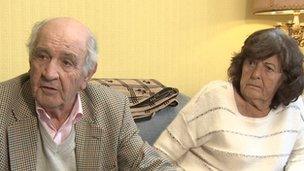Children's homes: 'Worrying' standards of care
- Published

George and Linda Thomsett are unhappy about how their grand-daughter was looked after in care
One in four children in residential care in England is in a children's home rated "adequate" or "inadequate", according to research by Panorama.
A charity representing children in care said it was "extremely worrying".
The government says it wants to raise standards and plans to make "good" the minimum acceptable standard of care.
Ofsted inspects children's homes twice a year but reports are not easy to access for child protection reasons.
The findings were obtained through a Freedom of Information request.
Panorama asked all 134 councils with children's services in England about standards in the homes in which they placed children.
Of the 87 councils that responded, the programme established that one in four children was in a home rated "adequate" or "inadequate" on 31 December 2012.
There were cases of "good" care, with 17 councils saying all their children were in "good" or "outstanding" homes. These included Durham County Council, Surrey County Council and the London Borough of Camden.
But some councils said none of their children was in a home rated above "adequate".
'Worrying' findings
"I think those local authorities need to be held to account," said Natasha Finlayson, chief executive of The Who Cares? Trust.
"They need to explain why they think that's acceptable for those children."
Nearly 5,000 children are in children's homes in England.
In response to Panorama's research, the government said it was in talks with Ofsted to make "good" the acceptable minimum standard for residential care homes.
"They'll be changing the rating so it is "requires improvement" rather than "adequate" and we're working with them to see how quickly and swiftly we can bring that about," children's minister Edward Timpson said.
"We want to see good quality care right across children's homes because these children are some of the most vulnerable in our society."
Panorama also found through the Freedom of Information request that many children across the UK were being sent to live away from their home area. Some 147 out of 191 councils responded to the question, revealing that half (51%) of all their children were in homes outside the area.
Moving vulnerable youngsters away from their home areas can be important for their welfare and safety, but it can also lead to isolation and increase the risk of children going missing.
Moved far away
The grandparents of a troubled 17-year-old in residential care said they could not understand why she was moved 13 times in two years.
"As soon as she was happy and contented and settled down… they seemed to move her," said her grandfather, George Thomsett.
Zoe would always run home to her grandparents' house but was not allowed to stay.
Her grandmother, Linda Thomsett, said she had a feeling something was not right after a visit.
"I thought she was on drugs and when I came home here I said to George, 'Do you know what, I feel terrible about Zoe, I wish I'd brought her home,'" she said.

A photo of Zoe as a child in a picture frame at her grandparents' home
Just days later, Zoe died from a drug overdose in a private house. She had been missing from her children's home for three days.
A serious case review found the council had provided "extraordinary levels of human and financial resources" but "her constant moves meant there was a lack of consistent or co-ordinated support provided to her".
It costs £1bn a year to look after children in residential care in England, where most homes are privately run.
Panorama wrote to 10 of the bigger private companies asking for their Ofsted ratings. Six did not answer our questions.
Private profit?
One company which did reply was Family Care Associates, a family-owned chain of seven homes, all currently rated "good" or "outstanding". It invited Panorama to visit one of its homes in Blackburn.
Although it has the highest Ofsted rating, the company says councils are not placing children there and it will close next month.
"If the residential care market, for want of a better expression is price-driven, then inevitably local authorities are going to go to somebody who can provide something at a cheaper price," said Family Care Associates chief executive officer, Ed Nixon.
And there is growing concern that some smaller providers are being squeezed out of the market.
"I think what we're seeing is a small number of companies coming to dominate the market and having just a small number of providers in any market is never healthy," said Ms Finlayson.
- Published14 May 2013
- Published14 May 2013